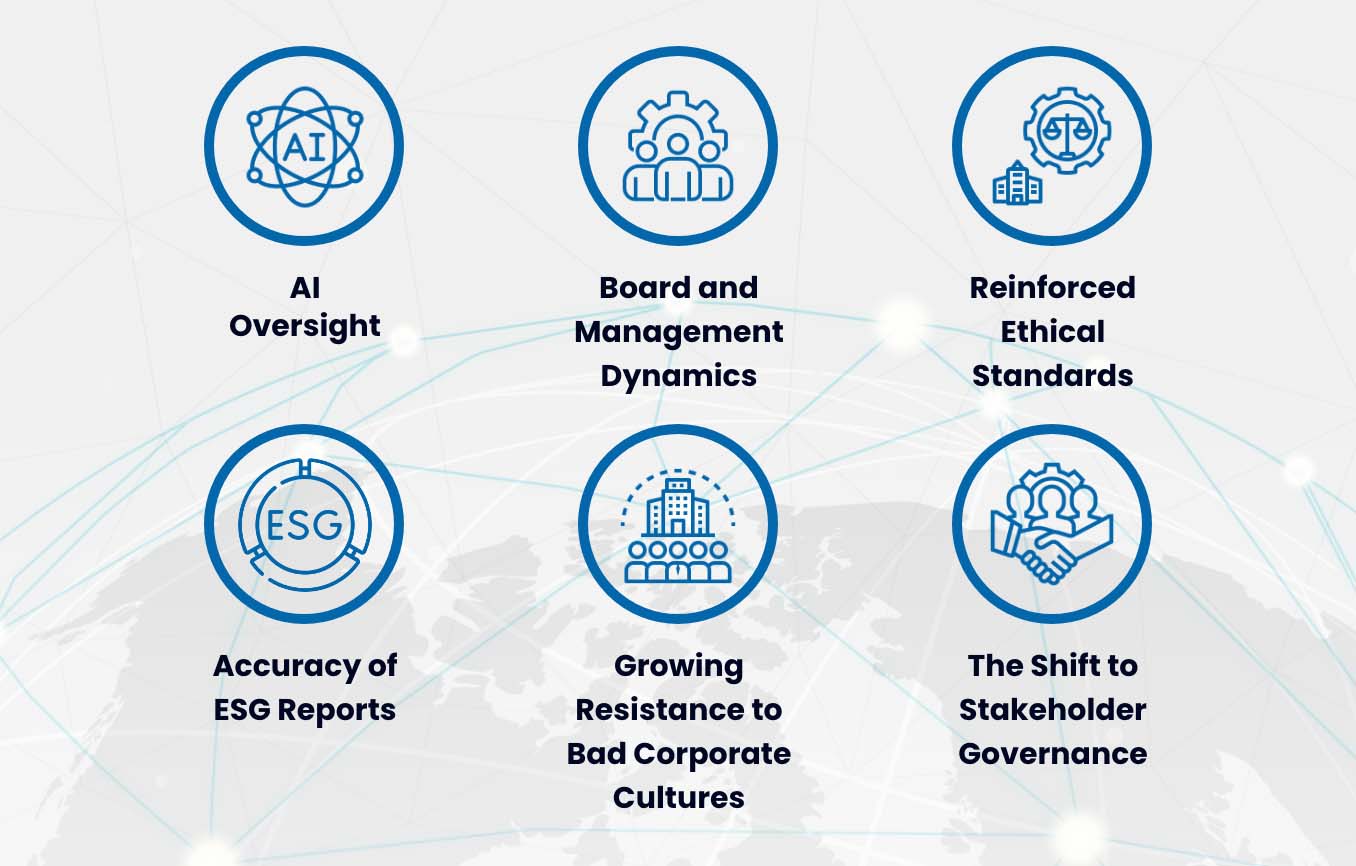2022 has seen heaps of disarray with continued supply chain issues, energy price crises, and rising inflation. Businesses were forced to shift priorities and adopt new policies to continue driving profitability. There were also actions on the regulatory front, particularly in corporate governance, to guide companies into transformation.
Moving to 2023, the pressure to adapt to the changing landscape continues. Investors and policymakers are looking for a change, and businesses must implement strong governance to maintain a good reputation. The stakes are undoubtedly higher for companies and their boards this new year.
To produce a better annual outlook, here are the emerging trends in corporate governance for 2023 and beyond.
Top Global Corporate Governance Trends

AI Oversight
The regulatory landscape surrounding artificial intelligence (AI) systems continues to grow over the past years. Leading the regulatory efforts is the European Commission, which attempts to a cross-sectoral AI regulation referred to as the GDPR of AI. If passed, extensive compliance obligations on the use of AI systems will be implemented.
AI is also predicted to be at the forefront of data-driven scenario planning for companies and boards. However, there’s currently an emerging oversight in the use of AI systems. A survey by Baker McKenzie found that executives and boards are aware of the risks associated with AI, but only 4% consider these risks to be “significant” and 52% label the risks to be “somewhat significant”.
Business Roundtable launched the initiative, “Roadmap for Responsible Artificial Intelligence (AI)”, to support companies in the implementation of responsible AI. This is followed by the release of a set of policy recommendations for AI governance and oversight. Following this, the US Chamber of Commerce launched its Artificial Intelligence (AI) Commission on Competition, Inclusion, and Innovation to advance the US leadership in AI utilisation and regulation.
Board and Management Dynamics
The dynamics between the board and management is a critical facet of strong corporate governance. This relationship, however, is expected to be strained by changes. Boards and CEOs were previously challenged by reckless corporate behaviour and other corporate scandals.
Now, more boards are seeking true independence from management. In one survey, 51% of directors in private company boards identified as independent. Such change causes constraints in the management’s influence in the boardroom, wherein mutual respect is not relatively easy.
As for management, its independence is typically influenced by conflicts of interest or board oversight. In some cases, top management often feels that board actions are not monitored and evaluated appropriately, resulting in feelings of unfairness and questioning of work responsibilities.
A clear definition of roles, responsibilities, and authorities is recommended to achieve a balance of corporate power between the board and management.
Reinforced Ethical Standards
Unethical behaviour or corporate misconduct has been affecting companies for several years now. Thousands have experienced compliance failure and risks of illegal behaviour, resulting in reputational risks and expensive lawsuits.
Unethical behaviour may also lead to heavy fines. One notable instance is when Wells Fargo paid $3 Billion for its staggering fake accounts scandal. This unlawful conduct harmed customers’ credit ratings and use their personal information to wrongly collect millions in interest and fees.
Reinforce ethical conduct by establishing clear, lawful standards and procedures and ensuring directors and employees understood them. Explicit ethical expectations should also be set, which should apply to any employee or supervisor.
Accuracy of ESG Reports
Investors and consumers are digging deeper into ESG disclosures, ensuring it contains only truthful and accurate data. In PwC’s 2022 Global Investor Survey, 87% of investors suspect that corporate reports contain unsupported sustainability claims like greenwashing. Research also suggests that only one-third or 33% of investors believe the quality of ESG reporting they are seeing is “good”.
As sustainability reports contain various data types, one could improve accuracy by implementing a strict monitoring process. This involves critical progress tracking of targets and industry benchmarks. Developing strong data collection and validation processes can also help produce the highest-quality reports.
To do so, companies utilise ESG reporting tools for the seamless collection of sustainability-related data and generation of reports. ESG reporting software like ConveneESG delivers flexible reporting capabilities, from tracking internal data, performing industry benchmarks, to actual creation of disclosures.
Growing Resistance to Bad Corporate Cultures
Poor corporate cultures lead to high levels of waste and complaints and can stunt business growth. More policymakers and consumers show increasing resistance to bad governance. Just last year, the European Union set up a new rule to ban iPhone chargers and encourage the use of the same plug starting in 2024. A perfect example that bad governance can cripple even the biggest businesses.
In fact, employees say that a positive company culture can influence business growth and success. A survey by Glassdoor also found that 56% of employees consider company culture to be more important than salary in terms of job satisfaction. Developing positive corporate culture requires strong leadership, and increase efforts and communication when driving change.
The Shift to Stakeholder Governance
Among all events, the pandemic indeed elevated the shift to stakeholder governance. This prompted companies to consider the best interests of their workers, customers, and other investors. Stakeholder governance encourages ethical behaviours and seeks to prevent the spread of disinformation and environmental risks.
Talking about stakeholder capitalism, BlackRock CEO Larry Fink said in his Annual 2022 Letter to CEOs, “In today’s globally interconnected world, a company must create value for and be valued by its full range of stakeholders in order to deliver long-term value for its shareholders.” He further emphasised effective stakeholder capitalism can also lead to better profitability and capital allocation.
In relation, a survey from The Conference Board found that 90% of executives believe a shift from stockholder to stakeholder capitalism is underway and 80% reveal that it is affecting their companies. Such change demands an evolution in culture, as well as roles and responsibilities.
Navigate Through the Shifting Governance Landscape with Convene
Board portal technology has emerged as a robust governance solution. Companies that want to steadily sail in the ever-shifting governance landscape require a dedicated board portal. Convene aims to make this journey easier. From new corporate mandates to ongoing trends, Convene serves as a secure and compliant solution for efficient board management.
Stay relevant and up to date with Convene. Learn more about our board governance software.
Jielynne is a Content Marketing Writer at Convene. With over six years of professional writing experience, she has worked with several SEO and digital marketing agencies, both local and international. She strives in crafting clear marketing copies and creative content for various platforms of Convene, such as the website and social media. Jielynne displays a decided lack of knowledge about football and calculus, but proudly aces in literary arts and corporate governance.










